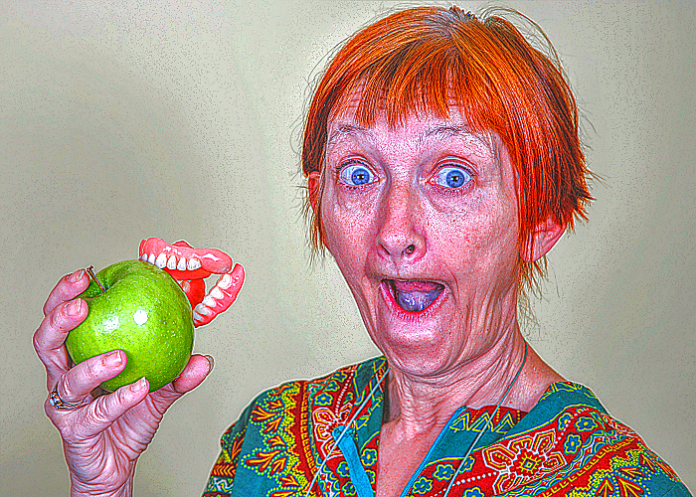Dentures may have a significant negative impact on a person’s overall nutrition, according to research from Regenstrief Institute and Indiana University School of Dentistry. The study team leveraged electronic dental and health records to gain a better understanding of how oral health treatments affect people’s overall health over time.
This is believed to be the first study to report the results of using lab values of nutritional biomarkers and linking them with dental records.
“Dentures are a significant change for a person. They do not provide the same chewing efficiency, which may alter eating habits,” said senior author Thankam Thyvalikakath, DMD, MDS, PhD, director of the Regenstrief and IU School of Dentistry Dental Informatics programme.
“Dentists need to be aware of this and provide advice or a referral for nutrition counselling. These patients need support during the transition and possible continued monitoring.”
For the study, which was published in the Journal of Prosthodontics, the research team matched the dental records of more than 10,000 patients in Indiana with medical laboratory data, specifically markers for malnutrition. The laboratory tests included complete blood count, basic metabolic profile and lipid and thyroid panel tests, among others. They compared the lab results from two years before a patient received dentures to the two years after.
Researchers found that people with dentures had a significant decline in certain nutrition markers over those two years. People who did not wear dentures did not experience this decline. The marker levels were still within normal range, but researchers say there is the potential that the levels will continue to fall as more time passes. They urge dentists to be aware of this possibility.
They wrote that inter-relationship between ageing and tooth loss in the 21st century has changed from the 1970s, with a decrease in partially or completely edentulous (not having their natural teeth) individuals. Nevertheless, disparities in access to oral care lead to tooth loss, especially in populations adversely impacted by race and other socio-economic factors.
They said risk factors like smoking, periodontitis, untreated caries, disability, and injuries also lead to complete or partial tooth loss.
They pointed out that in addition, the population older than 65 years is expected to double in the United States to 83.7m by 2050; and an increased rate of 24% by 2060. This trend, they said, suggests that the percentage of the older population losing their natural teeth will increase, meaning dentulism remains a relevant problem for the foreseeable future.
They added that people who have lost their teeth or who wear any prosthesis are shown to be at risk of malnutrition, with experimental and observational evidence demonstrating an association between tooth loss, diet, and nutrition.
The next steps in this research area are to look at other factors that may influence nutrition, including insurance status and dental clinic characteristics.
Study details
Nutritional Assessment of Denture Wearers Using Matched Electronic Dental‐Health Record Data.
Grace Gomez Felix Gomez, Sopanis D. Cho, Roshan Varghese, Divya Rajendran, George J. Eckert, Sruthi Surya Bhamidipalli, Theresa Gonzalez, Babar Ali Khan, Thankam Paul Thyvalikakath.
Published in the Journal of Prosthodontics on 23 March 2022
Abstract
Purpose
To assess the nutritional profile of denture wearers through a retrospective cohort study using nutritional biomarkers from matched electronic dental and health record (EDR-EHR) data.
Materials and methods
The case group (denture wearers) included matched EDR-EHR data of patients who received removable partial, complete, and implant-supported prosthodontic treatments between January 1, 2010 and December 31, 2018, study time. The control (nondenture wearers) group did not have recorded denture treatments and included patient records within 1 year of the denture index date (first date of case patients’ receiving complete or partial denture) of the matching cases. The qualified patients’ EDR were matched with their EHR based on the availability of laboratory reports within 2 years of receiving the dentures (index date). Nutritional biomarkers were selected from laboratory reports for complete blood count, comprehensive and basic metabolic profile, lipid, and thyroid panels. Summary statistics were performed, and general linear mixed effect models were used to evaluate the rate of change over time (slope) of nutritional biomarkers before and after the index date. Likelihood ratio tests were performed to determine the differences between dentures and controls.
Results
The final cohort included 10,481 matched EDR-EHR data with 3,519 denture wearers and 6,962 controls that contained laboratory results within the study time. The denture wearers’ mean age was 57 ±10 years and the control group was 56 ±10 years with 55% females in both groups. Pre-post analysis among denture wearers revealed decreased serum albumin (p = 0.002), calcium (p = 0.039), creatinine (p < 0.001) during the post-index time. Haemoglobin (Hb) was higher pre-index, and was decreasing during the time period but did not change post-index (p < 0.001). Among denture wearers, completely edentulous patients had a significant decrease in serum albumin, creatinine, blood urea nitrogen (BUN), but increased estimated glomerular filtration rate (eGFR). In partially edentulous patients, total cholesterol decreased (p = 0.018) and TSH (p = 0.004), BUN (p < 0.001) increased post-index. Patients edentulous in either upper or lower arch had decreased BUN and eGFR during post-index. Compared to controls, denture wearers showed decreased serum albumin and protein (p = 0.008), serum calcium (p = 0.001), and controls showed increased Hb (p = 0.035) during post-index.
Conclusions
The study results indicate nutritional biomarker variations among denture wearers suggesting a risk for undernutrition and the potential of using selected nutritional biomarkers to monitor nutritional profile.
See more from MedicalBrief archives:
US dentists come under scrutiny over their power to stifle competition
Evidence grows for vaping’s role in gum disease – New York University study
Cavity-prevention approach effectively reduces decay

